|

Winter 2005 (13.4)
Pages
46-49
Music History
Erasing Names From History: The Role of Jeyhun Hajibeyli in Azerbaijan's
First Opera
by
Jeyhun Hajibeyli, brother of composer Uzeyir Hajibeyli
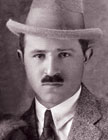  Most people credit Uzeyir Hajibeyov
(1885-1948) with composing the "First Opera of the Muslim
East" based on the story of Leyli and Majnun. The story,
which premiered in 1908, is based on a Romeo-Juliet type of love
story from an Arabic legend that was set to poetic verse by 12th
century poet Nizami and later by 16th century poet Fuzuli. Most people credit Uzeyir Hajibeyov
(1885-1948) with composing the "First Opera of the Muslim
East" based on the story of Leyli and Majnun. The story,
which premiered in 1908, is based on a Romeo-Juliet type of love
story from an Arabic legend that was set to poetic verse by 12th
century poet Nizami and later by 16th century poet Fuzuli.
But there was a second person deeply involved in the creation
of this opera - Uzeyir's brother Jeyhun (1891-1962). Even the
1908 program notes of "Leyli & Majnun", written
in Arabic script (Azerbaijani) and Russian, support the fact
that these two brothers were co-authors of the work.
How is it that Jeyhun's name disappeared from the credits over
the years? Simply, like so many other events and realities in
Azerbaijan that took place in the 20th century, history suffered
from being revised and rewritten. After the Bolsheviks took control
of Baku in 1920, it became "politically incorrect"
and even dangerous to continue listing the names of people who
contributed to the artistic life of Azerbaijan who were adamantly
opposed to the Soviet regime.
When Azerbaijan sought independence from the czar, Jeyhun and
his brother Uzeyir had been active members of the Musavat Party,
which was the leading political party that helped to establish
the short-lived independent Democratic Republic of Azerbaijan
(1918-1920).
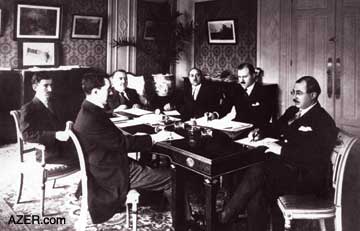  Jeyhun had the chance to accompany the
Azerbaijani political delegation that represented the country
in its attempts of gaining recognition from Europe and the United
States at the Versailles Treaty in Paris. Jeyhun had the chance to accompany the
Azerbaijani political delegation that represented the country
in its attempts of gaining recognition from Europe and the United
States at the Versailles Treaty in Paris.
Uzeyir remained in Baku. When th e Bolsheviks
took control of Baku (April 28, 1920), Jeyhun was in Paris. He
soon realized that he would be risking his life to return since
he had been so active politically. e Bolsheviks
took control of Baku (April 28, 1920), Jeyhun was in Paris. He
soon realized that he would be risking his life to return since
he had been so active politically.
He knew that many of those who opposed the Bolsheviks had been
killed.
Above:
Azerbaijan's delegation
to the Treaty of Versailles (1919) to gain international acknowledgement
of Azerbaijan as a nation. Clockwise from center front: Abbas
Atamalibeyov, Mammad Maharramov, Alimardan Topchubashov, Akbar
Agha Sheikhulislamov, Jeyhun Hajibeyli, Miryagub Mirmehdiyev.
Fatali Khoiski was Prime Minister at the time for the Azerbaijan
Democratic Republic (ADR). Photo: Courtesy Ramiz Abutalibov.
And thus, the door was slammed shut and Jeyhun never returned
to Azerbaijan. He carried this deep pain in his heart to the
end of his days. Basically, communications between the two brothers
were severed. For Uzeyir to have any foreign associations, either
friends or relatives living outside of the Soviet Union, could
jeopardize his own life.
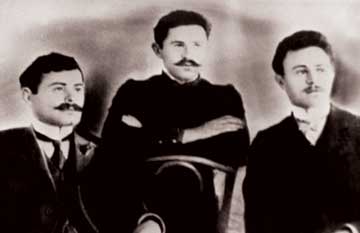  They
say that during the dreaded period of Stalin's repressions (1930s
and 1940s) Uzeyir often used to sleep with his street clothes
on, fearing a dreaded knock on the door that would lead to his
arrest. They
say that during the dreaded period of Stalin's repressions (1930s
and 1940s) Uzeyir often used to sleep with his street clothes
on, fearing a dreaded knock on the door that would lead to his
arrest.
Left:
The three Hajibeyov brothers
(left to right): Zulfugar, Jeyhun and Uzeyir. 1907-1908. Photo:
Hajibeyov home museum.
Thousands of intellectuals had such experiences. Thousands were
arrested and either executed or sent to labor camps in Central
Asia or Siberia. Jeyhun
Hajibeyli later went on to write for the "Caucasian Review",
a publication, which was an extension of the Institute for the
Study of the USSR, funded by the United States government.
The following article, published in 1957, was written by Jeyhun
Hajibeyli to commemorate the 50th Jubilee of the origin of opera
in Azerbaijan. The date itself links back to this opera - Leyli
& Majnun. Here Jeyhun observes how his collaboration on this
famous work was deliberately omitted and how history, thus, was
rewritten.
Today, it is still rare for Azerbaijanis to acknowledge the role
that Jeyhun played in this work because of the precedent established
during the Soviet period.
We reprint Jeyhun's comments here to show the kinds of pressures
that artists and musicians had to deal withwhen Stalin (1879-1953)
was in power. This article appeared in "The Caucasian Review"(Volume7,
pages159-161), published in Munich in 1957.
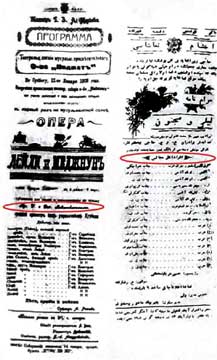  Azerbaijan's First Opera Azerbaijan's First Opera
The 50th Jubilee of Azerbaijan Opera [as a genre] should have
been celebrated on January 12, 1958, to commemorate the first
performance of the first Azerbaijani opera, Leyli and Majnun
in the Taghiyev Theater in Baku on January 12, 1908.
Left: Program for the first performance
of Leyli and Majnun on January 12, 1908, which was printed in
Russian and Azeri (Arabic script). Uzeyir and his brother Jeyhun
are both listed as the composers. In 1919, Jeyhun accompanied
the Azerbaijan delegation of the ADR (Azerbaijan Democratic Republic)
to the Versailles Treaty in Paris where they were trying to gain
recognition for the statehood of Azerbaijan.
When the Bolsheviks took control of the government in Baku (1920),
Jeyhun feared for his life if he returned to his Homeland. He
spent the rest of his years in Europe, propagating against the
Soviet Union. This jeopardized his brother Uzeyir who was still
living in Baku. Over the years, Jeyhun's name has disappeared
as one of the composers of this work - Leyli & Majnun - which
was recognized as the first opera of the Muslim East. Photo:
National Archives of Azerbaijan.
It soon became evident, however, from brief and intermittent
announcements in the press that the Soviet authorities of Azerbaijan
intended to postpone the celebrations until April 28, with the
obvious desire to show a relationship between the development
of operatic art with the Sovietization of the country, which
occurred on April 28, 1920 [when Bolsheviks took control of Azerbaijan].
In an article in Azerbaijan Ganjlari [Azerbaijani Youth] entitled
Nasha Gordost [Our Pride] published on April 27, 1958, I. Nazarov,
Minister of Culture of the Azerbaijan SSR, expressed the deep
interest of the Party in the musical accomplishments of the Azerbaijani
people. Of course, he did not forget, at the same time, to discuss
the ideological side of the question.
He also mentioned the names of a dozen young composers of the
Soviet era, who had created a number of important works. It seems
he forgot, on this particular occasion, his own sharp criticism
of these very same works in the January issue of Azerbaijan Kommunist.
The first Azerbaijani opera, Leyli and Majnun, was written by
my brother Uzeyir and me. Uzeyir continued his fruitful activities
as a talented composer and librettist while I later entered politics
and took an active part in the struggle against Communist domination.
Consequently, my name is no longer mentioned as a co-author of
the opera.
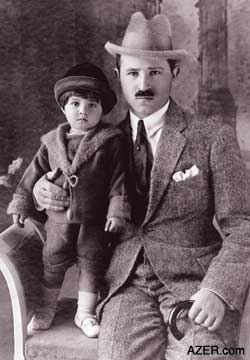  Rewriting of History by Soviets Rewriting of History by Soviets
In an account given
by Soviet reviewers of the first presentation of Leyli and Majnun,
not only has the name of Jeyhun Hajibeyli been omitted, but also
the names of many members of the original cast have been left
out, especially those who took an active part in the struggle
against the Sovietization of the country. The Soviet authorities
replaced those names with others that were more acceptable to
the regime.
Left: Jeyhun Hajibeyli in Paris with his
son. 1920s. When the Bolsheviks took control of Baku, Jeyhun
could not return. He spent the rest of his life as an exile,
living outside of Azerbaijan. Photo: Courtesy Clement Baily,
grandson of Jeyhun Hajibeyli, Paris.
In addition, numerous people, who probably enjoyed the confidence
of the Communists, wrote their memoirs posing as sponsors of
the production of the first Azerbaijani opera. As I had been
connected with this opera since its very inception, I'm in a
position to say that I have never even heard of the names of
these gentlemen who supposedly encouraged this initiative.
The truth is, that throughout Baku, only the cultural society
Nijat, and a certain individual Imran Gasimov, who was a member
of the middle class, suppoerted and encouraged the compposers
in any way. Nijat was materially interested and Imran Gasimov
was eager to display his talents as a singer.
Rehearsals were held in Hotel Islamia, the residence of the composers,
and in Gasimov's home - much to the dismay of Imran's brother,
Haji. Many people were skeptical about the opera and thought
it would end in utter failure.
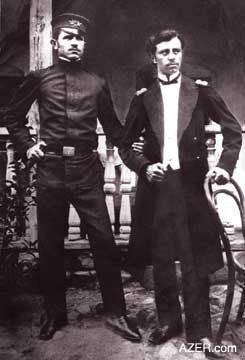  Some
religious reactionaries were disturbed and even hostile towards
the idea. In order to prevent any possible outbreak during the
performance, the promoters asked Bashir bey Ashurbeyov, a prominent
member of the community and respected by the people of Baku,
to address the audience before the curtain went up and to ask
them to sit quietly during the performance and not to distract
the performers in any way. Some
religious reactionaries were disturbed and even hostile towards
the idea. In order to prevent any possible outbreak during the
performance, the promoters asked Bashir bey Ashurbeyov, a prominent
member of the community and respected by the people of Baku,
to address the audience before the curtain went up and to ask
them to sit quietly during the performance and not to distract
the performers in any way.
Left: Jeyhun Hajibeyli (left) with Uzeyir
Hajibeyov in 1910s. Photo: Courtesy Baily, grandson of Jeyhun
Hajibeyli, Paris.
This warning brought about unforeseen consequences. The audience
not only sat quietly, but they were afraid to applaud the scenes
of pathos in the opera. Only deep sighs and moans were heard
and tears were shed; the audience vividly felt the suffering
of the principal characters as portrayed by the script of Nizami
and Fuzuli and our musical interpretation.
The venture turned out to be a complete success, and the opera
was performed several times by public demand. This encouraged
my brother to continue his creative activities exploring new
fields.
During the six years [1909-1914] following his production of
Leyli and Majnun, Uzeyir produced four more operas: Sheikh Sanan,
Rustam and Zohra, Sheikh Abbas and Khurshud Banu, and Asli and
Karam. These were all based on legendary themes. He also wrote
three musical comedies - Arshin Mal Alan, Mashadi Ibad and Husband
and Wife - which were based on contemporary themes, and which
criticized the bourgeois classes.
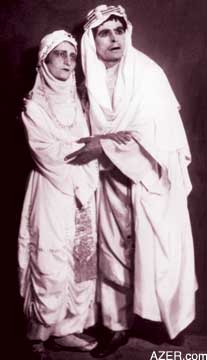  His
musical comedy, Arshin Mal Alan [Cloth Peddler His
musical comedy, Arshin Mal Alan [Cloth Peddler ],
was particularly successful. It was translated into many languages
and like Leyli and Majnun, it is still performed in many countries. ],
was particularly successful. It was translated into many languages
and like Leyli and Majnun, it is still performed in many countries.
Left:
Hagigat Rezayeva, the first
professional woman to perform the role of Leyli in "Leyli
and Majnun". All roles were traditionally performed by men.
Huseingulu Sarabski here as Majnun. 1928. Photo: Courtesy Azer
Rezayev, family archives, son of Hagigat Rezayeva.
As is well known, the atmosphere created by the Soviet regime
did not encourage a free expression of creative artistic talent.
In the 28 years which followed the Sovietization of Azerbaijan,
Uzeyir Hajibeyli produced only one more opera - Koroghlu (Son
of a Blind Man) though it is considered one of his best works.
Although Koroghlu was written in 1934, it was not produced until
1938, on the occasion of the Festival of Azerbaijani Music in
Moscow.
The production of Koroghlu on this occasion was probably prompted
by an article in Zarya Vostoka (Dawn of the East) on August 18,
1937 [at the height of Stalin's Repressions], indicating that
the authorities in Moscow had realized the need of acquainting
the public with the achievements of Azerbaijani opera at the
forthcoming festival and that they considered Uzeyir Hajibeyov
to be one of those who best represented these achievements.
The article states: Another shortcoming with the Baku opera repertoire
stems from the decision not to draw upon the rich legacy of Azerbaijani
music.
In 1928, because several leftist musicians had insisted, nearly
all of the entire rich legacy of Uzeyir Hajibeyli, the pioneer
of Azerbaijan opera, was excluded from the Baku opera repertoire.
For quite some time, the public was deprived of the opportunity
of seeing the stage productions of some of the best Azerbaijani
operettas such as Arshin Mal Alan, O Olmasin, Bu Olsun, and others.
Of course, the question of utilizing old Azerbaijani musical
works is debatable. Nevertheless, we think this question should
be raised as a subject for discussion by competent people.
During the visit of the Egyptian President Jamal Abdul Nasser
to Azerbaijan last spring [1956], Abdullayev, the Chairman of
the Azerbaijan Supreme Soviet, while acquainting his guest with
the culture of his country, told him that Leyli and Majnun was
the first Azerbaijani opera. He mentioned with pride the name
of Uzeyir Hajibeyov. On the very day he arrived in Baku, President
Nasser attended a performance of Leyli and Majnun.
During the celebrations of the 50th Jubilee of Azerbaijani Opera
on April 27, 1958, a statue of Uzeyir Hajibeyov, by the talented
sculptor Omar Eldarov was unveiled. Now, after Uzeyir's death,
many musical, cultural, and other institutions, are named after
him.
Now the Soviet authorities are trying to obliterate from the
pages of history the 18 years of systematic persecution, which
my brother, the founder of Azerbaijani opera suffered.
The cult of Uzeyir Hajibeyov may be explained by the fact that
there has been little interest in the field of opera in the country
since his death 10 years ago. Several attempts have been made
to write operas on historical subjects, but none has attained
a high artistic standard - a fact that has been lamented by responsible
elements in various congresses.
Back to Index AI 13.4 (Winter
2005)
AI Home
| Search | Magazine
Choice
| Topics
| AI Store | Contact us
Other Web sites
created by Azerbaijan International
AZgallery.org | AZERI.org | HAJIBEYOV.com
|